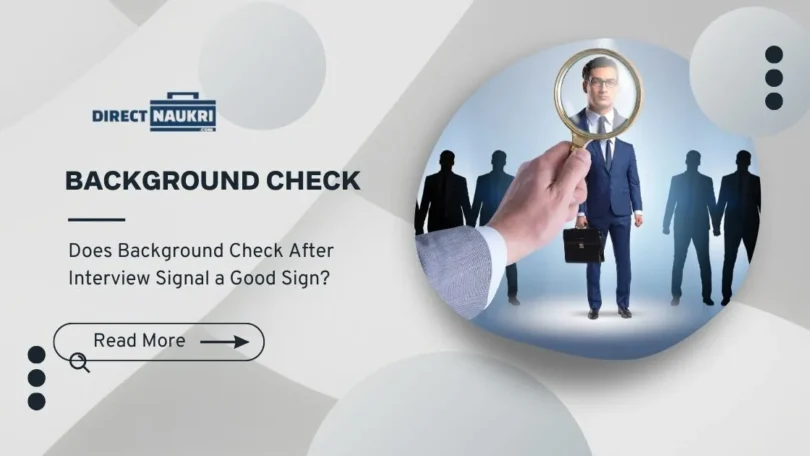Have you ever wondered what happens after a job interview? The anticipation can be nerve-wracking as you eagerly wait to hear back from the hiring manager.
But what if, after the interview, you find out that the company wants to conduct a background check on you? Is this a positive sign or a cause for concern?
In this blog post, we will delve into the world of background checks and explore whether they signal a good sign for job seekers.
What is a Background Check?
Before we delve into the implications of a background check, let’s start by understanding what it entails.
A background check is a process that employers use to verify the information provided by candidates during the hiring process.
This verification typically includes checking a candidate’s criminal record, employment history, educational qualifications, and references.
The Purpose of a Background Check
A background check serves several purposes for employers. First and foremost, it allows them to confirm the accuracy of the information provided by the candidate.
This step is crucial to ensure that the candidate possesses the qualifications and experience necessary for the role.
Additionally, a background check helps companies assess whether a candidate would be a good fit within their organization.
By examining a candidate’s criminal record, employers can ensure they are hiring someone who is trustworthy and won’t pose a safety risk to other employees or the company itself.
Positive Implications of a Background Check
While a background check can cause some anxiety for job seekers, it is important to remember that it often signals progress in the hiring process.
Here are some reasons why a background check after an interview can be seen as a positive sign:
1. Demonstrates Serious Consideration
When a company decides to conduct a background check, it indicates that you are being seriously considered for the position.
Employers typically invest time and resources into background checks for candidates who have performed well in the interview process.
So, if you find yourself undergoing a background check, it’s a good indicator that you have made it past several rounds of interviews and are being seriously considered for the role.
Earlier Post: How to Make a Career in Artificial Intelligence in India
2. Verification of Qualifications
A background check serves as a confirmation of your qualifications and experience. It reinforces the fact that the employer is interested in hiring someone who possesses the skills required to excel in the position.
By verifying your educational background and employment history, the company is ensuring that you are a credible candidate.
3. Focus on Employee Safety
Many companies prioritize the safety of their employees. By conducting a background check, employers aim to identify any potential red flags that might compromise the well-being of their staff.
So, if a company decides to proceed with a background check, it shows that they are committed to creating a safe working environment for their employees.
4. Boosts your confidence
Knowing that your potential employer is taking the time to thoroughly vet your background can give you a sense of confidence.
It is an indication that they are genuinely interested in your candidacy and are willing to put in the effort to ensure they are making an informed decision.
This can provide you with reassurance and motivation as you continue through the hiring process.
What if Negative Information is Uncovered?
While a background check is generally seen as a positive sign, there is always a possibility that negative information may surface.
It is essential to be prepared for this scenario and understand how to navigate it effectively.
If a background check reveals negative information such as a criminal record or discrepancies in your employment history, it is crucial to be transparent with the employer.
Reach out to them and provide an honest explanation for the discrepancies or past mistakes. Acknowledge the issue and highlight the steps you have taken to overcome and grow from it.
Demonstrating accountability and maturity in addressing any negative aspects uncovered during a background check can work in your favor.
Conclusion
In conclusion, a background check after an interview is generally a positive sign for job seekers. It shows that you are being seriously considered for the position and that the employer is investing resources to ensure you are a good fit for their organization.
While a background check can be an anxiety-inducing process, it is essential to approach it with confidence and transparency.
Remember that a background check is not meant to disqualify you but rather to confirm your qualifications and ensure the safety of employees.
So, if you find yourself faced with a background check after an interview, take it as a sign that you are one step closer to landing your dream job.
Embrace the opportunity to showcase your credibility and demonstrate your suitability for the role. With the right approach, a background check can be a positive step toward securing your desired position.
FAQs
Why do employers conduct background checks after interviews?
Employers conduct background checks to verify the accuracy of information provided by candidates and ensure they meet the requirements for the position.
What information is typically included in a background check?
Background checks may include criminal history, employment verification, education verification, credit history, and other relevant information.
Does a background check indicate a job offer is imminent?
While it’s a positive step, a background check doesn’t guarantee a job offer. Employers use it to make informed decisions and maintain a safe and reliable work environment.
How long does a background check after an interview usually take?
The duration varies, but background checks typically take a few days to a few weeks, depending on the complexity of the check and the responsiveness of third-party agencies.
Can a minor issue in a background check affect job prospects?
It depends on the severity and relevance to the job. Employers assess each case individually and may consider factors like rehabilitation and time passed since the incident.
Should I inform my employer about potential issues before the background check?
It’s advisable to be transparent during the hiring process. If you anticipate any concerns, discussing them beforehand may demonstrate honesty and responsibility.







